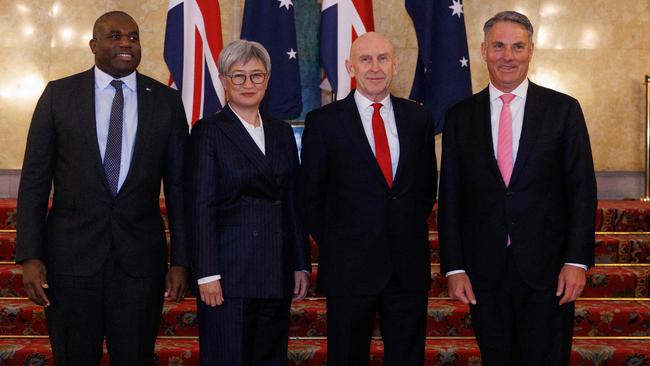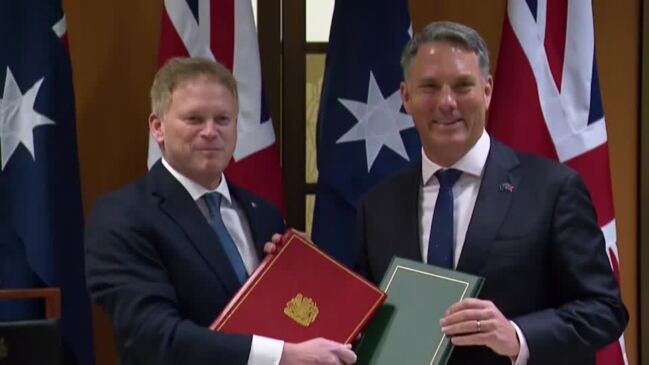Richard Marles won’t rule out Australian peacekeepers in Ukraine
The Defence Minister has refused to rule out Australia being involved in Ukraine on the ground in a future peacekeeping role.

Defence Minister Richard Marles has refused to rule out Australia being involved in Ukraine on the ground in a future peacekeeping role.
On Monday (local atime) Australian and British foreign and defence ministers held talks at Lancaster House in London, ahead of Foreign Minister Penny Wong heading to Brussels for a closed door NATO discussion on Tuesday, where Australia’s commitment to future developments in Ukraine are to be on the agenda.
When asked how far Australia would contribute in any sort of peacekeeping action, including troops, Mr Marles said: “We will continue to look at ways in which we can support Ukraine for a long as it takes and we will work really closely with the UK as to what that commitment looks like.”
He had earlier noted that Australia had increased the “tempo” of money being provided to Ukraine, of which $650m was in the past year bringing a tally of A$1.3bn including involvement in the UK-led training of Ukrainian soldiers on British soil, called Operation Interflex, which was being extended for a further year.

His suggestion that Australia would be heavily guided by the actions of the British when it comes to peacekeeping manoeuvres is a new development.
British Defence Secretary John Healey said when Ukrainian president Volodymyr Zelensky moves “to start talking, or instead of fighting,” the job of Allied nations is to “support them in any negotiations, just as we will through any battlefield fighting”.
Mr Healy added: “One of the important things that we discussed today, that we have affirmed publicly, is our commitment to stand with Ukraine throughout 2025.
“It’s designed to reinforce the confidence of the Ukrainian people that it has Allies in the west that will stand with them as long as it takes. And it’s designed also to message to Putin that he cannot prevail, he will not prevail, and Ukraine will have our support for as long as it needs.”
He said the AUKMIN meetings occurred immediately after a weekend where there was Russian bombardment of Ukraine with a new intensity.
“Over 100 ballistic cruise missiles were fired, and more than 200 drones,’’ Mr Healy said.
“At a time when Ukraine requires its staunchest allies to step up.”
Mr Healy stressed that Australia and Britain share an enduring unbreakable bond which is becoming increasing important in an increasingly unstable and threatening world.
“We are the closest of allies, Australia and the UK. We fight together, we stand together. And we underline the increasing indivisibility between security in the Euro-Atlantic area and security in the Indo-Pacific area,” he said.
Australia has agreed to contribute to Britain’s Carrier Strike Group would will undertake a flagship deployment to the Indo-Pacific in 2025, including Exercise Talisman Sabre 2025 with two Royal Australian Navy Hobart class destroyers – HMAS Brisbane and HMAS Sydney.
Other announcements included further work on the bilateral AUKUS treaty to establish a strategic and operational framework for the build and operation of SSN-AUKUS submarines.
Around 12 Australians will work from the newly established submarine office in Bristol to integrate various supply chains for the submarines.





To join the conversation, please log in. Don't have an account? Register
Join the conversation, you are commenting as Logout